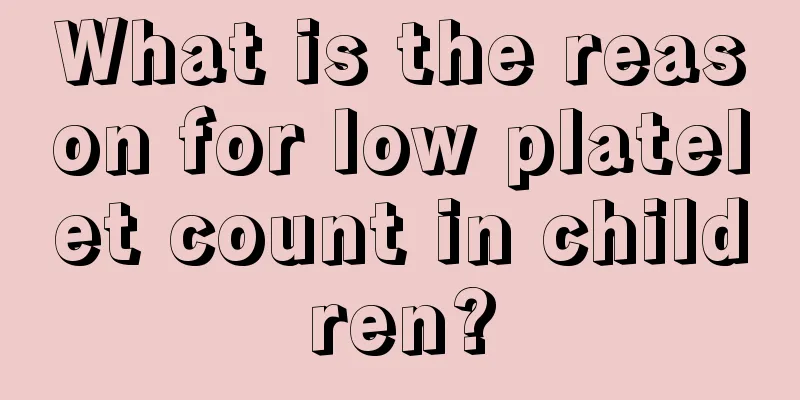What is the reason for low platelet count in children?

|
Platelets are an important component of the blood. If the platelet count decreases, it may pose a threat to the health of the blood. There are many reasons why children have low platelet counts. It may be due to problems with the body's immune system, low platelet production, or side effects of medications that hinder platelet production. If a child's platelet count is low, you can first treat it with simple medication or diet to see if there is any relief. If not, early treatment is necessary. Low platelet count in children may be caused by decreased platelet production If a child's platelet production is reduced, then the child's platelet count is of course low. Thrombocytopenia includes both hereditary and acquired. Acquired thrombocytopenia is caused by certain factors such as drugs, malignant tumors, infection, ionizing radiation, etc. that damage hematopoietic stem cells or affect their proliferation in the bone marrow. It is also common in blood diseases such as aplastic anemia and acute leukemia. These factors can affect multiple hematopoietic cells, often accompanied by varying degrees of anemia, leukopenia, and a significant decrease in bone marrow megakaryocytes. Low platelet count in children may be due to defects in the human immune system Low platelet count in children may be caused by defects in the human immune mechanism and an imbalance in the immune system, which is medically known as immune thrombocytopenia. There are many factors that can trigger this disease, including chemical poisons, radiation, ionizing radiation, vaccinations, inflammatory viral infections, drugs, excessive fatigue, etc. These factors can only be speculated and it is impossible to determine what exactly caused it. Mainly, these inducing factors have no direct relationship with treatment. For example, if the patient is caused by long-term exposure to chemical toxins, the important thing is to cure the root cause and prevent recurrence. If it is cured, it will not be affected by any factors and recur. Children's low platelets may be affected by medication 1. Drugs that cause low bone marrow regeneration or disorder accompanied by pancytopenia. Chemical substances and drugs that can easily cause bone marrow hypoplasia at a certain dose: ① Benzene, xylene, etc. ②Alkylating agents: such as nitrogen mustard, cyclophosphamide, phenylpropionate mustard, etc. ③Antimetabolites: such as cytarabine, mercaptopurine, etc. ④Anti-cancer antibiotics: such as doxorubicin, adriamycin, etc. ⑤Others: such as organic arsenic, etc. 2. Drugs that can cause bone marrow aplasia or hypoplasia: such as chloramphenicol, sulfonamides, penicillin, streptomycin, Xinqing No. 1, trimethadione, phenytoin sodium, ethosuximide, antithyroid drugs (such as thiouracil, propylthiouracil, thyroxine), diabetes drugs (such as tolbutamide, chlorbutamide, chlorpropamide, etc.), phenylbutazone, indomethacin, tranquilizers and sedatives (tranquilization, chlordiazepoxide, chlorpromazine, etc.), gold preparations, hair dyes, promethazine, chlorpheniramine, acetazolamide, etc. 3. Drugs that selectively inhibit the production of platelets by megakaryocytes: such as chlorothiazide, estrogens, ethanol, tolbutamide, ristocetin, etc. |
<<: What causes anemia in children?
>>: Why does baby's stool smell bad?
Recommend
Why does a child cough in the morning?
Traditional Chinese medicine emphasizes symptomat...
The harm of picky eating in children
Each type of food has its own irreplaceable nutri...
Can motion sickness patches be used on children?
When you go out, you need to take a car, no matte...
Can I use an electric fan when my baby has a fever?
It is actually normal for babies to have a fever,...
What should I do if my baby has a poor appetite?
As children grow up, various problems are inevita...
Characteristics of the Eustachian tube in children
The Eustachian tube, also known as the Eustachian...
What is Sudden Infant Death Syndrome?
Nowadays, every child is the treasure of the fami...
White spots on children's tonsils
If you find white spots in the throats of many ch...
What should primary school students pay attention to in aerobics training
Many friends who want to lose weight will choose ...
Treatment of children's encephalitis, mothers must remember
Childhood encephalitis is a pediatric disease wit...
What is the reason for the three-month-old baby's shortness of breath?
When parents are taking care of their babies, the...
What are the height standards for boys?
In recent years, with the improvement of people&#...
The baby's temperature is less than 36 degrees after the fever injection
When the baby has a high fever, he needs to be gi...
How to clean the vulva of a baby girl correctly?
We all know that women should pay attention to ta...
What’s wrong if my baby has very little bowel movement?
People are always full of joy when a baby is born...









